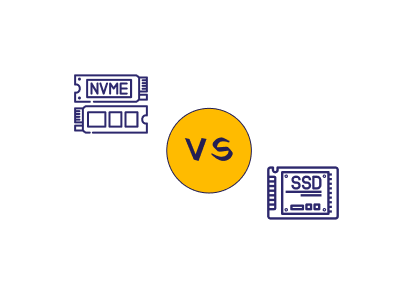Different elements and resources are involved in making web hosting operations easier when you discuss the web hosting service. One such factor is the disk space where website files are stored. If the disk space is more, it can accommodate volumes of data. Just understand from an example that a huge box can store more items.
Earlier in the computing days, HDD (Hard Disk Drives) were used on a large scale. Most users prefer this kind of storage device because it is a non-volatile storage drive (storing data without any power supply). But with the changing technology, SSDs (Solid-State Drives) have gained popularity, and this kind of storage system is installed in hosting servers’ CPU.
SSDs have a broad category, and in recent times, SSD NVMe has emerged as the prominent storage option in hosting servers. Thus, MilesWeb is the leading SSD NVMe storage space in every web hosting plan.
Now, how ordinary SSD storage space is different from SSD NVMe storage spaces? Let’s decode this answer briefly in the guide below. Don’t miss out on any point because, after this post, you will be able to find the right NVMe hosting service provider.
Table Of Content
What Is Meant By SSD?
With the growing technology demand, traditional hard disks (HDDs) caused downtime problems. Hosting users never want to experience any website performance issues. Therefore, SSDs came up as an innovative storage solution. This storage system is connected to the motherboard through a physical interface.
This storage system has a standard flash memory to store data. Also, it has a non-volatility feature with NAND storage. Although, despite of the hardware upgradation, SATA and SAS interfaces are used for data transfer.
An ordinary Solid-State Drive has some limitations due to its older interface. The primary difference between SSDs and HDDs is the absence of rotating disks like those found in an HDD. Without moving parts, SSDs store and access data using semiconductor memory chips.
Related: SSD Hosting: Learn About The Advantages
What Is Meant By The NVMe?
NVMe is an upgradation of ordinary SSDs introduced in 2013 by Samsung. This storage technology directly connects with the CPU bus (a medium to transfer data) and not through the SATA route. As a result, users yield the maximum efficiency and performance of websites or other web projects on servers.
The full form of NVMe is Non-Volatile Memory Express, and the “Express” term depicts the Peripheral Component Interconnect Express (PCIe) bus. Thus, achieving a higher performance level with a lower latency rate is possible because of this data transfer network.
MilesWeb assures a higher uptime because all our servers are configured with SSD NVMe disks. Therefore, our clients get 99.95% uptime on their web projects and maximum online availability.
Despite the power outage, there will be no data loss problem. Some reports and data show that NVMe versions work 20 times faster than ordinary SSDs. So, why invest in ordinary SSDs if you get an efficient option? Achieve the maximum uptime and a blazing-fast speed for your web projects with our best SSD NVMe servers.
Key Differences: SSD vs NVMe
– Cost
Power and reliability come at a certain cost. Thus, you will find that NVMe storage servers are comparatively more expensive than ordinary SSDs. But remember, when it comes to hosting mission-critical workloads and web pages, instead of investing in multiple servers, prefer NVMe storage. The overall operational cost will be lesser when you take downtime as a key factor. Remember that due to the downtime, users experience a major revenue loss.
– Speed
The speed factor is something that gives the NVMe disk storage an upper hand. On average, SSD drives function at an average speed of 400 MB/s, but NVMe storage excels in this parameter with an average speed of 4000 MB/s. Therefore, to reap the benefit of maximum online availability and faster performance, get NVMe storage servers.
Related: HDD and SSD Hosting – Which is Best for You?
How NVMe Drives Make Websites Faster?
– Fast Loading Time
If the data transfer is quick, the website loading time will be less. You should know that NVMe drives work faster due to higher numbers of Disk I/O (Input Output operations). Also, these drives handle multiple queries without lag and instantly retrieve information.
– Enhanced Database Performance
A database typically handles more inputs and outputs in websites such as eCommerce stores and blogs. For your database to respond to queries faster, these actions must be performed at lightning speed.
This database query takes time with typical HDD hosting solutions, which results in lengthy load times. Due to their boosted read and write speeds, NVMe storage servers can help you overcome this database efficiency limitation.
The speed, power and technical efficiency of SSD NVMe servers are far better than traditional disk drives. That is why MilesWeb’s hosting servers include SSD NVMe disk drives. Traditional hard disk drives are less compatible with all devices. On the other hand, NVMe drives are accessible on all major operating systems like Windows and Linux.








